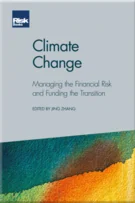Behavioural Risk Management in the Financial Markets
Preface
An Introduction to Behavioural Risk Management
Risk Management Context
Value-at-Risk as the Dominant Risk Management Tool in the Financial Industry
Case Studies on Risk Management Failure
The Role of Regulation in Risk Management
Advances in Behavioural Economics and Finance
Behavioural Issues with Probability
Systems Theory
Using Scenarios
Making Robust Decisions
Advances in the Risk Management Process
Behavioural Risk Management in the Financial Markets
Countervailing Power
Behavioural Risk Management: Closing Thoughts
Appendix: Selective list of Behavioural Biases
Bibliography
For financial institutions, managing financial assets is central to their business. There is much research in this area that highlights that financial market participants are not so rational as the traditional neoclassical theories assume. This is visible in the choice of certain assets, the frequency of trades, the responses to market information and the appetite for risk. Due to its importance of the financial industry, this chapter will carry out a detailed investigation into the implications of behavioural economics without repeating the messages of earlier chapters. Some even call this field behavioural finance, and the academic field has provided many surprising insights into the irrational behaviour of investors and the potential explanations.
Although the chapter will discuss some specific insights of behavioural finance, it will be limited to those aspects relevant for risk management specifically rather than exploring the entire field. It will also analyse the investment process and how risk managers can add value to it through the use of behavioural perspectives. We will look at the investment process because the implications are clearest there. However, many of the
Copyright Infopro Digital Limited. All rights reserved.
As outlined in our terms and conditions, https://www.infopro-digital.com/terms-and-conditions/subscriptions/ (point 2.4), printing is limited to a single copy.
If you would like to purchase additional rights please email info@risk.net
Copyright Infopro Digital Limited. All rights reserved.
You may share this content using our article tools. As outlined in our terms and conditions, https://www.infopro-digital.com/terms-and-conditions/subscriptions/ (clause 2.4), an Authorised User may only make one copy of the materials for their own personal use. You must also comply with the restrictions in clause 2.5.
If you would like to purchase additional rights please email info@risk.net








